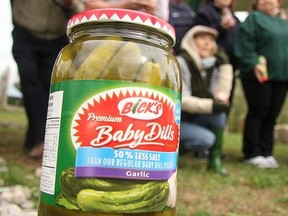Politics
Canadian Pickles Disappear from Shelves Amid Tariff Dispute

Canadian grocery shelves have seen a notable absence of Bick’s pickles since June 2023, a situation resulting from a tariff dispute that highlights significant shortcomings in the federal government’s trade policies. The case of Bick’s serves as a critical example of how well-intentioned initiatives can inadvertently harm consumers and local suppliers.
Bick’s, a brand originally acquired by Smucker’s in 2011, ceased operations at its Toronto production facility shortly thereafter. Currently owned by TreeHouse Foods, Bick’s pickles are now manufactured in the United States. Although the brand has transitioned away from being fully Canadian, it still relies on local sources for some of its supply chain, including cucumbers from Canadian farmers and lids from domestic manufacturers. Under the Canada-United States-Mexico Agreement (CUSMA), these raw cucumbers can cross into the U.S. tariff-free. However, once processed and packed in U.S. facilities, they return to Canada as Bick’s pickles, now subject to Canadian counter-tariffs.
The implications of this tariff structure are significant. Grocery retail margins are exceptionally thin, typically ranging from 2% to 4%. Retailers are unable to absorb substantial cost increases and often pass these costs onto consumers. In some cases, the price hikes may lead retailers to remove products from their shelves entirely. Sobeys has already taken steps to delist Bick’s, and it is anticipated that other major grocers will follow suit.
Ironically, this policy aimed at protecting domestic producers has led to a decrease in competition and consumer choice, while simultaneously driving up prices. Sobeys has opted to reallocate shelf space to its own private-label pickles, which tend to be imported and offer higher profit margins. The end result is a pickle market that is less Canadian than before.
The flaws in this policy are glaringly evident. Canada is effectively imposing taxes on products made with Canadian cucumbers and lids simply because they are processed in the U.S. This approach undermines the intended protection strategy, resulting in an economic setback for Canadian businesses.
While some may argue that TreeHouse Foods should consider reopening a production facility in Canada, the financial realities of food processing make this unlikely. The company could simply choose to withdraw from the Canadian market altogether, diminishing competition and showcasing Canada’s comparatively weaker position against the United States, home to nearly 400 million consumers.
The Bick’s situation further emphasizes a broader concern: Canada’s food supply chains are less adaptable than those in the U.S. When faced with tariffs or disruptions, American importers can swiftly pivot to alternative suppliers. In contrast, Canadian importers, limited by scale and available options, have significantly less flexibility. This can lead to even tariff-exempt Canadian goods losing shelf space to foreign alternatives.
To prevent a recurrence of such issues, Canada must reassess its approach to tariff policy. It is crucial that policies recognize Canadian content and the realities of integrated cross-border supply chains. A jar of pickles primarily made from Canadian ingredients should not be penalized simply because final processing occurs in the United States.
Additionally, reversing the decline in domestic food manufacturing is imperative. Without renewed investment in processing capabilities, vulnerabilities will only increase. The Bick’s case is not an isolated incident; it serves as an early warning signal.
If trade and tariff policies do not undergo significant recalibration, more products may quietly vanish from Canadian store shelves, replaced by less Canadian options, ultimately leading to higher prices for consumers. While the federal government may believe its counter-tariff strategy sends a strong message to Washington, the real message reaching Canadian households is stark: fewer choices, higher prices, and a diminishing Canadian presence in the grocery cart.
-

 Politics4 weeks ago
Politics4 weeks agoSecwepemc First Nation Seeks Aboriginal Title Over Kamloops Area
-

 World5 months ago
World5 months agoScientists Unearth Ancient Antarctic Ice to Unlock Climate Secrets
-

 Entertainment5 months ago
Entertainment5 months agoTrump and McCormick to Announce $70 Billion Energy Investments
-

 Science5 months ago
Science5 months agoFour Astronauts Return to Earth After International Space Station Mission
-

 Lifestyle5 months ago
Lifestyle5 months agoTransLink Launches Food Truck Program to Boost Revenue in Vancouver
-

 Technology3 months ago
Technology3 months agoApple Notes Enhances Functionality with Markdown Support in macOS 26
-

 Lifestyle3 months ago
Lifestyle3 months agoManitoba’s Burger Champion Shines Again Amid Dining Innovations
-

 Top Stories2 months ago
Top Stories2 months agoUrgent Update: Fatal Crash on Highway 99 Claims Life of Pitt Meadows Man
-

 Politics4 months ago
Politics4 months agoUkrainian Tennis Star Elina Svitolina Faces Death Threats Online
-

 Sports5 months ago
Sports5 months agoSearch Underway for Missing Hunter Amid Hokkaido Bear Emergency
-

 Politics5 months ago
Politics5 months agoCarney Engages First Nations Leaders at Development Law Summit
-

 Technology5 months ago
Technology5 months agoFrosthaven Launches Early Access on July 31, 2025





















